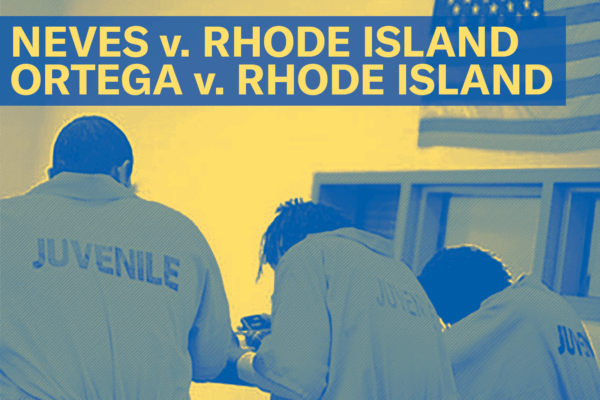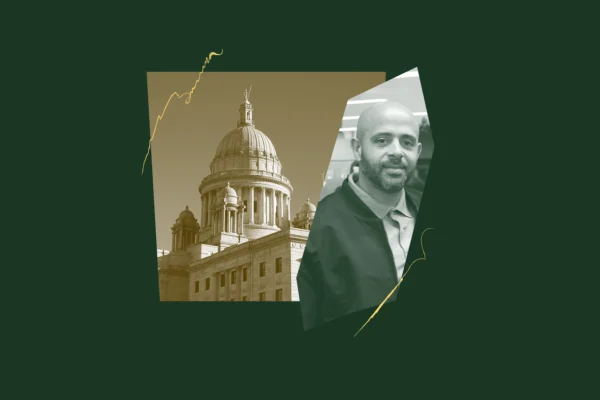ACLU of Rhode Island cooperating attorneys charged today that state officials were “grasping at straws” in an effort to undermine an important criminal justice reform enacted by the General Assembly last year to give young offenders serving lengthy sentences a chance to demonstrate that they deserve an early release on parole.
The charge was made in a brief submitted in R.I. Superior Court in three cases filed this year by the ACLU attorneys and that are scheduled to be heard next week. The cases claim that the R.I. Department of Corrections (DOC) is unlawfully keeping in prison three individuals who were convicted of crimes committed when they were juveniles or very young adults. The suit alleges that the three are entitled to release under the new statute, known as Mario’s Law, and the conclusion of the Parole Board that each should be paroled in recognition of their rehabilitation. The statute provides that “any person sentenced for any offense prior to his or her twenty-second birthday” is eligible for parole after serving twenty years.
Notwithstanding the statute’s clear language, a brief filed by the Attorney General’s office earlier this week claims that the law does not apply to juvenile offenders with more than one sentence. Rather, in an argument the ACLU brief calls “nonsense,” the State claims that the statute’s reference to parole eligibility for “any” offense actually means “an” offense, and therefore youthful offenders serving consecutive sentences get no benefit from the 20-year window. The ACLU’s response engages in a foray of various dictionary definitions of the word “any” to conclude:
The hallmark of all of these definitions of the word “any” as a modifier is that it connotes “one or some of a thing or number of things, no matter how much or how many” and is not limited to “one” or a “singular” amount. The State has not cited any case law or scholarly attribution for its distinctly unusual interpretation of the word “any” as actually restricted to a singular “an.”
The court petitions were filed on behalf of Pablo Ortega, Joao Neves, and Keith Nunes, each of whom as teenagers were given life sentences for murder and consecutive sentences for related criminal conduct. They have now spent more than 20 years at the ACI. The Parole Board agreed that each of them deserved parole, but deferring to the DOC’s interpretation of Mario’s Law, “paroled” them only to their consecutive sentence, which must be served before they can be released to the community.
The petitions for post-conviction relief, filed by ACLU of Rhode Island cooperating attorneys Lisa Holley, Sonja Deyoe and Lynette Labinger, attack the State’s interpretation of the law as “defeat[ing] the Act’s purpose, which is to recognize and require that the Parole Board accord special consideration to youthful offenders not extended to adult offenders.” The brief notes that:
The State’s literal argument, taken to its logical conclusion, would be that the Youthful Offender Act is not applicable—at all—to any person sentenced on multiple offenses, even those running concurrently, since that person has not been convicted of “an” offense, entitling them to the benefits of the Act. But the State has not taken that position. And rightly so, since it would lead to absurd results.
The petitions seek immediate release from custody of the three petitioners, subject to conditions placed on their parole by the Parole Board.
The state’s interpretation of the law affects a number of other youthful offenders, including Mario Monteiro, whose continued incarceration for more than two decades, despite extensive proof of his rehabilitation since his criminal conduct as a juvenile, was an impetus for passage of the new statute aimed at giving youthful offenders a second chance after serving two decades in prison. Legislators passed the law in recognition of the fact that, as the U.S. Supreme Court has noted, “even when they commit terrible crimes,” juveniles lack the culpability of adults due to their immaturity and underdeveloped sense of responsibility.
A hearing on the petitions is scheduled for next Thursday, March 31st at 9:30 AM before Superior Court Judge Stephen Nugent.
ACLU cooperating attorney Labinger said today: “Both the letter and intent of Mario’s Law are clear: to give individuals, once they have served at least 20 years in prison for crimes they committed in their youth, a chance to demonstrate that they have met the standards for release to the community on parole. It is disappointing, particularly in the face of this clear mandate and simple language, to see the office of the Attorney General argue that words mean the opposite of what they say in order to justify the Department of Corrections’ disregard of this clear legislative directive.”
Attorney Deyoe added: “When Mario’s Law was passed last summer, our legislature recognized that those younger than 22 years of age were less culpable for their acts than those who were older. The interpretation of the law put forth by the Attorney General completely nullifies the act. Ironically, it would do nothing to affect the time that Mario Monteiro himself has to serve. This is clearly not what the legislature intended.”


